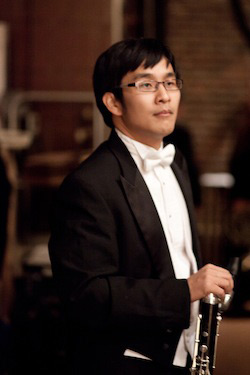In February, the Colorado Symphony welcomed Lyle Wong into the fold as the organization’s new Principal Orchestra Librarian. Lyle follows in the distinguished footsteps of Joanne Goble, who retired from the position after serving as the Colorado Symphony’s Principal Orchestra Librarian since 1988.

Orchestra Librarians are responsible for the care, upkeep, distribution, and research involving all the music that’s performed. They’re responsible for making sure that music reaches the musicians in the best way possible so there’s as little barrier as possible between the musicians playing and the audience listening. They also act as historians within the organization, keeping records of each performance including repertoire, guest artists, and conductors. And when necessary, they’re counted on to fill in as substitutes within the orchestra.
Prior to joining the Colorado Symphony, Lyle held several music librarian positions including with the Cincinnati Symphony Orchestra, Music Academy of the West, Orchestra of the Americas, Breckenridge Music Festival, and most recently at the Louisiana Philharmonic Orchestra as their Principal Orchestra Librarian. Lyle has a Bachelor of Music-Clarinet Performance from the University of Michigan and Artist Diploma-Clarinet Performance from the University of Cincinnati College-Conservatory of Music.
Q: Tell us about your background in music.
Lyle Wong: My background in music is mainly as a clarinetist. I went to school as a clarinet performance major and was educated in a very similar way to my colleagues on stage. My original goal was to play the clarinet for a living, so I went through the audition gauntlet and won a few regional orchestra jobs that include the Delaware Symphony, Arkansas Symphony, and Opera Cleveland Orchestras. Later, this performance and education background served as my foundation for becoming an orchestral librarian. I previously worked with the Cincinnati Symphony Orchestra, Music Academy of the West, Orchestra of the Americas, and Louisiana Philharmonic Orchestra. In addition to this new post with the Colorado Symphony, I also currently work with Breckenridge Music.
Q: What was your first awareness of the role of an orchestra librarian and how did you choose to pursue it as a career?
LW: When I was performing more consistently, I was rather clueless to the role of the orchestra librarian. My first real awareness occurred when I picked up summer work in the music library of the Cincinnati Symphony Orchestra and later when I started working as Cincinnati’s Assistant Librarian. The awakening occurred as I worked on recording projects with Erich Kunzel and the Cincinnati Pops Orchestra. I remember the moment exactly — standing in a line with my librarian colleagues, as Erich listened to music that was just recorded. He would send one of the four librarians out to mark an artistic edit in pencil (sometimes in color pencil for emphasis) and the next librarian would step up to receive the next edit instruction. It was an eye-opening process and really the behind the scenes work that made so many of the iconic Cincinnati Pops recordings.
I decided to pursue being a full-time orchestra librarian after working a number of orchestral administrative job and mainly performing with regional orchestras. I wanted something between the stage and the office; and that was the music library.
Q: What does an orchestra librarian do that an audience member or fellow musician might not see?
LW: Part of the orchestral librarian’s job is to make performing music as easy as possible. I want my colleagues to have no sheet music obstacles when creating the music you hear. Meaning that even before my fellow musicians receive sheet music to practice, a many number of things need to happen to create effortless rehearsals and performances. Everything from acquiring licensing to fixing copyist errors and coordinating string bowings. And when done right, this organizational process is planned long before the season, maintained continuously, and happens to every piece of music.
Q: How does the orchestra librarian interact with publishers, composers, musicians, and conductors?
LW: The orchestral librarian interacts with these four groups in different ways, but we can divide them into two groups so I don’t get deep into the weeds. Publishers/composers and musicians/conductors.
A composer/copyright holder, they are entitled to various rights and publishers manage the right to distribute their music and issues licensing. I acquire the rights for the Colorado Symphony to legally perform these works in the vision of our conductors and artistic team. This includes the rights to perform the work, rent the sheet music, broadcast and many others, depending on the situation. My interactions with our conductors and musicians are mainly in preparing the physical sheet music and scores.
Q: What attracted you to this position with the Colorado Symphony?
LW: Besides the wonderful things that the Colorado Symphony is doing, I was attracted to this organization because the position works in an administrative sense, but is considered a musician. I had to audition for my position like everyone else you see on stage. This is not the case with every orchestra and many times the librarian is just considered an administrator. I would say that there are 100-ish orchestral librarians in the United States, but only 20 to 30 with the distinction of musician.
Performing full-time never worked out for me, but I love what I do now and to still be recognized as a musician amongst my colleagues means the world to me. The next time you visit the symphony check out the administrative and orchestral rosters – besides our Maestro, I believe the librarian is the only other position listed on both rosters.
Q: What excites you most about moving to Colorado?
LW: Two things excite me the most about moving to Colorado- the proximity to my family and exploring the outdoors. I was born and raised in Honolulu, Hawaii and almost all of my family still resides there. I moved away for college and have since lived most of my adult life in the Midwest and Southern parts of the United States. As I get older, I would like to be closer to my family and I was recently reminded that I can get direct flights to Honolulu. Just the fact that I don’t have to take two layovers and round trips can cost less than $1,200 is a game changer!
With regards to the outdoors, I came to Colorado for the first time in 2012 as the Stage Manager for the National Repertory Orchestra (Breckenridge) and was immediately drawn to the outdoors. I had not experienced that feeling since I lived in Honolulu and started to miss it when I moved home. So I made it a priority to experience the Colorado outdoors every summer since 2012, whether that meant stopping through on road trips or making it part of my summer work, as I do now with Breckenridge Music.
Side note: Outdoor snow activities are new to me, but want to learn. And I am up to seventeen 14ers, currently making my way down the Collegiate Range and looking for others that want to climb the more difficult peaks.
Quick Facts:
Q: Where were you born/raised?
A: Honolulu, Hawaii
Q: Where did you receive your formal education?
A: Bacholor of Music in Performance at the University of Michigan and an Artist Diploma in Performance from the University of Cincinnati.
Q: Are there any special teachers who’ve helped you in your career?
A: Yes! Teacher and life coach Richie Hawley- former Principal Clarinetist of the Cincinnati Symphony Orchestra and now clarinet professor at Rice University.
Q: What are some of your hobbies?
A: Hiking, recreating food from my childhood, commuting by bicycle and reading.

